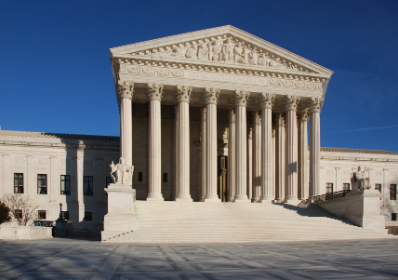
The U.S. Supreme Court has thwarted a major threat to our country’s democracy.
In a 6-3 opinion written by Chief Justice John Roberts in Moore v. Harper today, the court rejected the so-called “independent state legislature” theory that could have endangered our democratic process. While many expected the court to find the case moot (because of a change in the makeup of the N.C. Supreme Court), in a surprising ruling on the merits Roberts wrote for the court: “State courts retain the authority to apply state constitutional restraints when legislatures act under the power conferred upon them by the Elections Clause.”
Here’s a bit of an explanation about the stakes at play. In challenging court-ordered redistricting plans in their state, Republicans in North Carolina were arguing that the language of the U.S. Constitution gives total control over federal elections to the state legislatures, and therefore state courts have no power to review legislative action in this area. In other words, they claimed that because the federal Constitution gives state legislatures the power to regulate congressional elections, only the federal Constitution can restrain the exercise of that power.
This is an extreme argument that would have removed any checks on state legislative power over elections, thereby undermining democracy. A version of this argument was pushed in the efforts to overturn the democratic results of the 2020 election — that state legislatures have ultimate unchecked authority to appoint their preferred electors regardless of the popular vote in their state. Needless to say, this ploy was anti-democratic to the hilt.
Today’s ruling provides some relief for our embattled secular democracy. However, the argument that failed here will continue to be advanced in other contexts. Not only did three dissenting justices express support for it, Justice Brett Kavanaugh invited further anti-democratic action from state legislators in his concurrence. He wrote separately to express his view that, although state legislative action on federal elections is not insulated from state court review, state court must give extreme deference to state legislators in such cases.
Fortunately, sanity generally prevailed on the court for now.
“The legislature acts both as a lawmaking body created and bound by its state constitution, and as the entity assigned particular authority by the federal Constitution,” reads the majority opinion. “Both constitutions restrain the legislature’s exercise of power.”
Since the U.S. Supreme Court heard arguments in the case, the makeup of the N.C. Supreme Court shifted, and that court ordered a rehearing of the case. This was largely seen as likely mooting the case before the Supreme Court. Justice Clarence Thomas’ dissent argued, in addition to his disagreement with the court’s ruling on the merits, that the case was moot and shouldn’t have been decided.
Thankfully, the court rendered a decision — and one that will provide a tonic to our democratic system.
“The Supreme Court has demonstrated that even in these partisan times, it can boost our secular democracy,” says FFRF Co-President Annie Laurie Gaylor. “It has rejected a patently absurd notion that was attempting to override the will of the people.”
The Freedom From Religion Foundation is a national nonprofit organization with more than 40,000 members across the country. Our purposes are to protect the constitutional principle of separation between state and church, and to educate the public on matters relating to nontheism.

